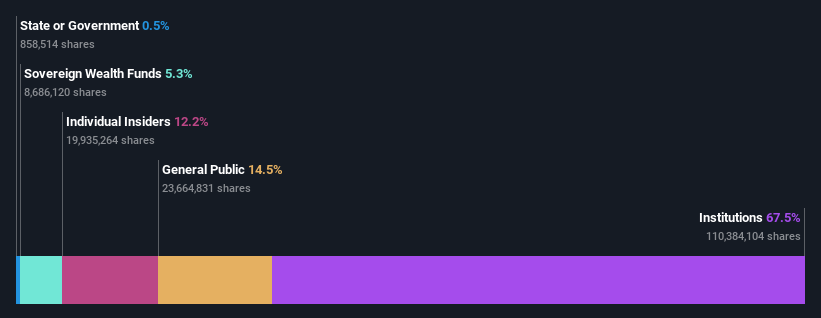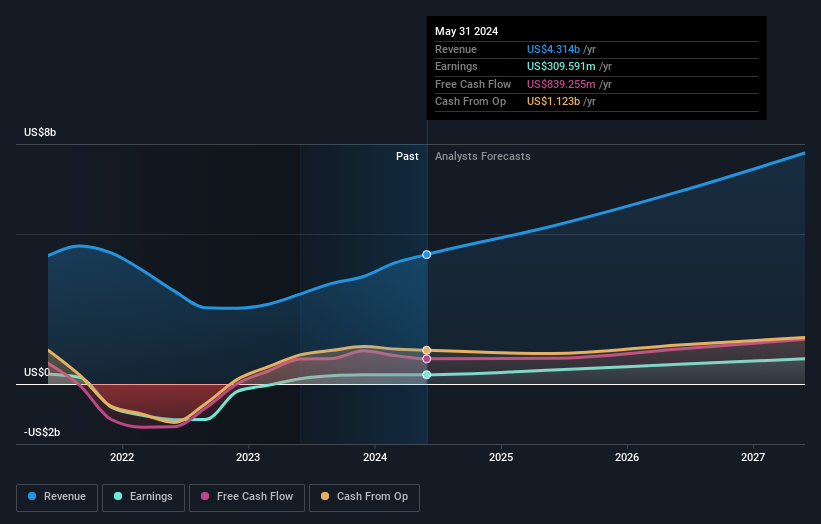- United States
- /
- Consumer Services
- /
- NYSE:EDU
New Oriental Education & Technology Group Inc.'s (NYSE:EDU) institutional investors lost 5.9% over the past week but have profited from longer-term gains

Key Insights
- Significantly high institutional ownership implies New Oriental Education & Technology Group's stock price is sensitive to their trading actions
- 51% of the business is held by the top 11 shareholders
- Insider ownership in New Oriental Education & Technology Group is 12%
If you want to know who really controls New Oriental Education & Technology Group Inc. (NYSE:EDU), then you'll have to look at the makeup of its share registry. With 68% stake, institutions possess the maximum shares in the company. Put another way, the group faces the maximum upside potential (or downside risk).
Losing money on investments is something no shareholder enjoys, least of all institutional investors who saw their holdings value drop by 5.9% last week. However, the 16% one-year returns may have helped alleviate their overall losses. But they would probably be wary of future losses.
Let's take a closer look to see what the different types of shareholders can tell us about New Oriental Education & Technology Group.
See our latest analysis for New Oriental Education & Technology Group

What Does The Institutional Ownership Tell Us About New Oriental Education & Technology Group?
Many institutions measure their performance against an index that approximates the local market. So they usually pay more attention to companies that are included in major indices.
New Oriental Education & Technology Group already has institutions on the share registry. Indeed, they own a respectable stake in the company. This can indicate that the company has a certain degree of credibility in the investment community. However, it is best to be wary of relying on the supposed validation that comes with institutional investors. They too, get it wrong sometimes. It is not uncommon to see a big share price drop if two large institutional investors try to sell out of a stock at the same time. So it is worth checking the past earnings trajectory of New Oriental Education & Technology Group, (below). Of course, keep in mind that there are other factors to consider, too.

Since institutional investors own more than half the issued stock, the board will likely have to pay attention to their preferences. Hedge funds don't have many shares in New Oriental Education & Technology Group. Because actions speak louder than words, we consider it a good sign when insiders own a significant stake in a company. In New Oriental Education & Technology Group's case, its Top Key Executive, Minhong Yu, is the largest shareholder, holding 12% of shares outstanding. Meanwhile, the second and third largest shareholders, hold 7.2% and 5.9%, of the shares outstanding, respectively.
A closer look at our ownership figures suggests that the top 11 shareholders have a combined ownership of 51% implying that no single shareholder has a majority.
While studying institutional ownership for a company can add value to your research, it is also a good practice to research analyst recommendations to get a deeper understand of a stock's expected performance. There are plenty of analysts covering the stock, so it might be worth seeing what they are forecasting, too.
Insider Ownership Of New Oriental Education & Technology Group
While the precise definition of an insider can be subjective, almost everyone considers board members to be insiders. Company management run the business, but the CEO will answer to the board, even if he or she is a member of it.
Most consider insider ownership a positive because it can indicate the board is well aligned with other shareholders. However, on some occasions too much power is concentrated within this group.
Our information suggests that insiders maintain a significant holding in New Oriental Education & Technology Group Inc.. It has a market capitalization of just US$11b, and insiders have US$1.4b worth of shares in their own names. That's quite significant. Most would say this shows a good degree of alignment with shareholders, especially in a company of this size. You can click here to see if those insiders have been buying or selling.
General Public Ownership
The general public-- including retail investors -- own 14% stake in the company, and hence can't easily be ignored. While this size of ownership may not be enough to sway a policy decision in their favour, they can still make a collective impact on company policies.
Next Steps:
I find it very interesting to look at who exactly owns a company. But to truly gain insight, we need to consider other information, too.
I like to dive deeper into how a company has performed in the past. You can access this interactive graph of past earnings, revenue and cash flow, for free.
If you are like me, you may want to think about whether this company will grow or shrink. Luckily, you can check this free report showing analyst forecasts for its future.
NB: Figures in this article are calculated using data from the last twelve months, which refer to the 12-month period ending on the last date of the month the financial statement is dated. This may not be consistent with full year annual report figures.
Valuation is complex, but we're here to simplify it.
Discover if New Oriental Education & Technology Group might be undervalued or overvalued with our detailed analysis, featuring fair value estimates, potential risks, dividends, insider trades, and its financial condition.
Access Free AnalysisHave feedback on this article? Concerned about the content? Get in touch with us directly. Alternatively, email editorial-team (at) simplywallst.com.
This article by Simply Wall St is general in nature. We provide commentary based on historical data and analyst forecasts only using an unbiased methodology and our articles are not intended to be financial advice. It does not constitute a recommendation to buy or sell any stock, and does not take account of your objectives, or your financial situation. We aim to bring you long-term focused analysis driven by fundamental data. Note that our analysis may not factor in the latest price-sensitive company announcements or qualitative material. Simply Wall St has no position in any stocks mentioned.
About NYSE:EDU
New Oriental Education & Technology Group
New Oriental Education & Technology Group Inc.
Flawless balance sheet and undervalued.


